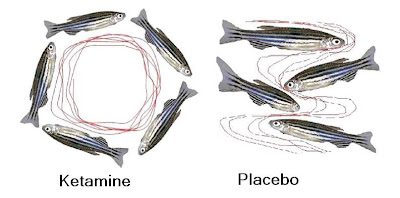 Ketamine is a drug of many talents. Used medically as an anesthetic in animals and, sometimes, in humans, it's also become widely used recreationally despite, or perhaps because of, its reputation as a "horse tranquilizer".
Ketamine is a drug of many talents. Used medically as an anesthetic in animals and, sometimes, in humans, it's also become widely used recreationally despite, or perhaps because of, its reputation as a "horse tranquilizer".Ketamine's also a hot topic in research at the moment for two reasons: it's considered an interesting way of provoking the symptoms of schizophrenia, and it's also shown promise as a fast-acting antidepressant.
Anyway, most ketamine research to date has been done in either humans or in rodents, but New York pharmacologists Zakhary et al decided to see what it does to fish. So they put some ketamine in the fishes water and saw what happened: A Behavioral and Molecular Analysis of Ketamine in Zebrafish.
 A high dose, 0.8%, just made the fish unconscious. Well, it is an anesthetic. But a low dose (0.2%) had rather more complex effects. It sent them literally loopy - they started swimming around and around in circles, usually in a clockwise direction. Control zebrafish swam about and explored their tanks without any circling behaviours.
A high dose, 0.8%, just made the fish unconscious. Well, it is an anesthetic. But a low dose (0.2%) had rather more complex effects. It sent them literally loopy - they started swimming around and around in circles, usually in a clockwise direction. Control zebrafish swam about and explored their tanks without any circling behaviours.They also examined the effect of ketamine on the "hypoxic stress" response, i.e. what happens when you take the fish out of water (only for 20 seconds, so it doesn't cause any real harm.) Normal fish struggle and gasp for water in this situation, unsurprisingly. Ketamine strongly inhibited this.
So what? Well, it's hard to say what this might mean. It would be great if the zebrafish turned out to be a useful experimental model for investigating the effects of ketamine and similar drugs, because they're much easier to work with than rodents (for one thing, it's a lot easier to just put a drug in a fish tank than to inject it into a mouse.)
However, it remains to be seen whether swimming in circles is a useful analog of the human effects of ketamine. Ketamine can make people act in some pretty stupid ways, but walking around in little circles is extreme even by K-head standards...
Link: I've blogged about ketamine before: I'm On K, You're On K.
No comments:
Post a Comment